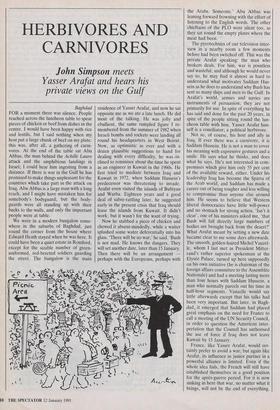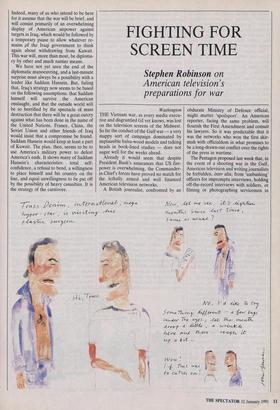HERBIVORES AND CARNIVORES
John Simpson meets
Yasser Arafat and hears his private views on the Gulf
Baghdad FOR a moment there was silence. People reached across the luncheon table to spear pieces of chicken or beef from dishes in the centre. I would have been happy with rice and lentils, but I said nothing when my host put a large chunk of beef on my plate: this was, after all, a gathering of carni- vores. At the end of the table sat Abu Abbas, the man behind the Achille Lauro attack and the amphibious landings in Israel; I could hear him ingesting from a distance. If there is war in the Gulf he has promised to make things unpleasant for the countries which take part in the attack on Iraq. Abu Abbas is a large man with a long reach, and I might have mistaken him for somebody's bodyguard; but the body- guards were all standing up with their backs to the walls, and only the important people were at table.
We were in a modern bungalow some- where in the suburbs of Baghdad, just round the corner from the house where Edward Heath stayed when he was here. It could have been a quiet estate in Romford, except for the sizable number of green- uniformed, red-bereted soldiers guarding the street. The bungalow is the main residence of Yasser Arafat, and now he sat opposite me as we ate a late lunch. He did most of the talking. He was jolly and ebullient, the same rumpled figure I re- membered from the summer of 1982 when Israeli bombs and rockets were landing all round his headquarters in West Beirut. Now, as optimistic as ever and with a dozen plausible suggestions to hand for dealing with every difficulty, he was ,in- dined to reminisce about the time he spent as an engineer in Kuwait in the 1960s. He first tried to mediate between Iraq and Kuwait in 1972, when Saddam Hussein's predecessor was threatening to invade. Arafat even visited the islands of Bubiyan and Warba. Eighteen years and a good deal of sabre-rattling later, he suggested early in the present crisis that Iraq should lease the islands from Kuwait. It didn't work; but it wasn't for the want of trying.
Now he stabbed a piece of chicken and chewed it absent-mindedly, while a waiter splashed some water deferentially into his glass. 'There will be no war,' he said. 'Bush is not mad. He knows the dangers. They will set another date, later than 15 January. Then there will be an arrangement perhaps with the Europeans, perhaps with the Arabs. Someone.' Abu Abbas was leaning forward frowning with the effort of listening to the English words. The other chieftains of the PLO were silent too, as they sat round the empty plates where the meat had been.
The pyrotechnics of our television inter- view in a nearby room a few moments before had been switched off. This was the private Arafat speaking: the man who brokers deals. For him, war is pointless and wasteful; and although he would never say so, he may find it almost as hard to understand what motivates Saddam Hus- sein as he does to understand why Bush has sent so many ships and men to the Gulf. In Arafat's world, armies and navies are instruments of persuasion; they are not primarily for use. In spite of everything he has said and done for the past 20 years, in spite of the people sitting round the lun- cheon table with him, Yasser Arafat him- self is a conciliator; a political herbivore.
Not so, of course, his host and ally in Iraq. If ever there was a carnivore, it is Saddam Hussein. He is not a man to cover his meaning with expressive gestures and a smile. He says what he thinks, and does what he says. He's not interested in com- promises which give him only 55 per cent of the available reward, either. Under his leadership Iraq has become the Sparta of the Arab world, and Saddam has made a career out of being tougher and less willing to compromise than anyone else around him. He seems to believe that Western liberal democracies have little will-power and no stomach for strong action. 'Isn't it clear', one of his ministers asked me, 'that Bush will fall directly large numbers of bodies are brought back from the desert?' What Arafat meant by setting a new date became clear to me some days afterwards. The smooth, golden-haired Michel Vauzel- le, whom I last met as President Mitter- rand's rather superior spokesman at the Elysee Palace, turned up here supposedly on his own initiative (he is chairman of the foreign affairs committee to the Assemblee Nationale) and had a meeting lasting more than four hours with Saddam Hussein, a man who normally parcels out his time in half-hour segments. Vauzelle would say little afterwards except that his talks had been very important. But later, in Bagh- dad,, it emerged that Saddam had placed great emphasis on the need for France to call a meeting of the UN Security Council, in order to question the American inter- pretation that the Council has authorised the use of force if Iraq does not leave Kuwait by 15 January.
France, like Yasser Arafat, would cer- tainly prefer to avoid a war; but again like Arafat, its influence as junior partner in a powerful alliance is limited. Even if the whole idea fails, the French will still have established themselves in a good position for the apres-guerre period. For it is now sinking in here that war, no matter what it brings, will not be the end of everything. Indeed, many of us who intend to be here for it assume that the war will be brief, and will consist primarily of an overwhelming display of American airpower against targets in Iraq; which would be followed by a temporary pause to allow whatever re- mains pf the Iraqi government to think again about withdrawing from Kuwait. This war will, more than most, be diploma- cy by other and much nastier means.
We have not yet seen the end of the diplomatic manoeuvring, and a last-minute surprise must always be a possibility with a leader like Saddam Hussein. But, failing that, Iraq's strategy now seems to be based on the following assumptions: that Saddam himself will survive the American onslaught, and that the outside world will be so horrified by the spectacle of mass destruction that there will be a great outcry against what has been done in the name of the United Nations. France, China, the Soviet Union and other friends of Iraq would insist that a compromise be found. Saddam Hussein would keep at least a part of Kuwait. The plan, then, seems to be to use America's military power to defeat America's ends. It shows many of Saddam Hussein's characteristics: total self- confidence, a refusal to bend, a willingness to place himself and his country on the line, and equal unwillingness to be put off by the possibility of heavy casualties. It is the strategy of the carnivore.











































 Previous page
Previous page